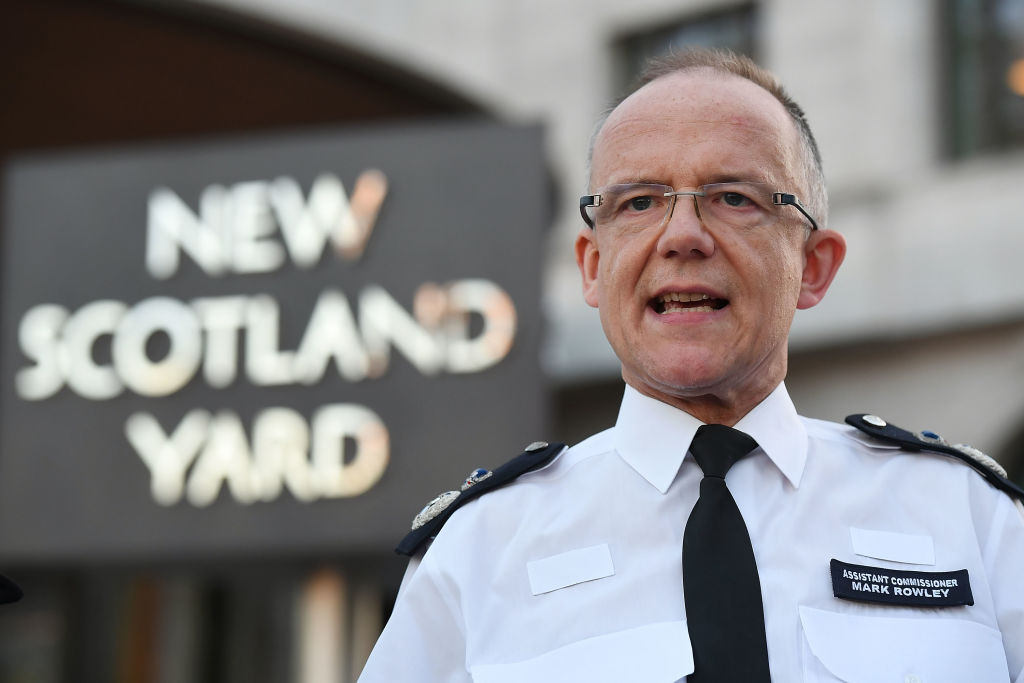Today marks a year since Sir Mark Rowley became Commissioner of the Metropolitan Police. When Rowley took over, his predecessor Cressida Dick had been pushed out of office, the force had been placed into ‘special measures’ for the first time in its 200-year history, and public trust had cratered following the conviction of police officers for some of the most heinous crimes imaginable. So has Rowley managed to steady the ship?
Over the past year there is no doubt that Rowley has made progress. He has restored stability – a feat that should not be underestimated. More wrong ‘uns in the force are now facing misconduct proceedings and criminal trials. This week, at an event with Policy Exchange, the Commissioner delivered an unequivocal and welcome message that police officers should not be getting involved with partisan political causes, dancing with protestors or ‘taking the knee’.
When it comes to operational policing the Met has also had some high-profile successes. With the conclusion of the manhunt for suspected terrorist and spy Daniel Khalife, the Met demonstrated its ability to take on and successfully conclude the highest-profile cases under intense scrutiny. We should not forget that over the last twelve months the Met has protected some of the biggest occasions of state, including the King’s coronation, that the capital has seen for a generation.
For too long the Met’s crime-fighting efforts have been marked by a sense of timidity
But a fifth of the way into what is a five-year project (and for him personally a five-year contract of employment) the piece missing has been a sense of boldness. Managerialism and small improvements will get the Met only so far and are certainly insufficient if the force is to survive the perfect storm that exists around policing today. The greater risk is to be found on what appears to be the safer course.
When he was appointed as Commissioner, Rowley was the best man for the job, and that remains the case today. He has the personal instincts and courage to be bold and take on the vested interests that do nothing other than block progress. He has to surround himself with people who are willing and able to drive through his agenda.
The Met’s senior operational leaders are key to Rowley being able to turn round the force. Each Chief Superintendent and Commander is responsible for directing the work of thousands of officers. If even one of these senior officers is not on board with his plan to turn round the Met then Rowley’s efforts will almost certainly be doomed to fail. In internal meetings recently Rowley has made clear what he expects from this cohort and indeed the ‘career limiting’ impact for those who are not with him. That is exactly the directness that is required, even if it is a message that should have been delivered far earlier.
Ultimately the primary basis on which Rowley will be judged is whether the public can see the difference in their communities. Many Londoners feel that their streets were long ago abandoned by the forces of law and order. Dame Sharon White, the boss of John Lewis, said shoplifting has become an ‘epidemic’ over the past year. The public need to see the gangs who deal drugs on their street corners taken apart. They want the burglars, robbers and violent thugs that terrorise their communities arrested, put before the courts and thrown in prison. Shoplifting, anti-social behaviour and other commonplace nuisances such as pavements being blocked by hired e- bikes must be ignored no longer.
Although quicker at dealing with protestors who cause disruption to the public, there remain too many examples where the Met is still not getting the policing of protest right. Often it appears that the Met’s misunderstanding of the law is leading to an excess of caution in how they deal with disruptive protests – with the public suffering as a result.
For too long the Met’s crime-fighting efforts have been marked by a sense of timidity – something that needs to visibly change. Those that refuse to give up their criminal lifestyle need to know and fear that the early morning knock from the Met is coming.
Long after Rowley’s term comes to an end the question will be asked, how will he be remembered? As one of the long list of Commissioners whose tenure is recalled as a footnote or worse, for leaving the Met in a worse state that he took it over; or will he be remembered as one of the few reforming Commissioners. Success will be if Rowley’s name becomes a byword for a well-ordered capital city where the criminals live in the certain knowledge of their rapid arrest and prosecution.
Today Londoners are neither more nor less safe than they were twelve months ago – if that’s still the same in a year it won’t be good enough. If Rowley is to be successful then he needs to be much bolder; the pace of change inside the Met needs to increase substantially and the evidence of that needs to be clear to see on our streets. The clock is ticking.






Comments